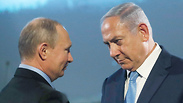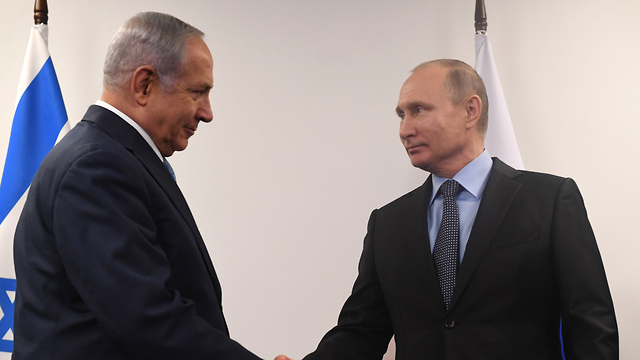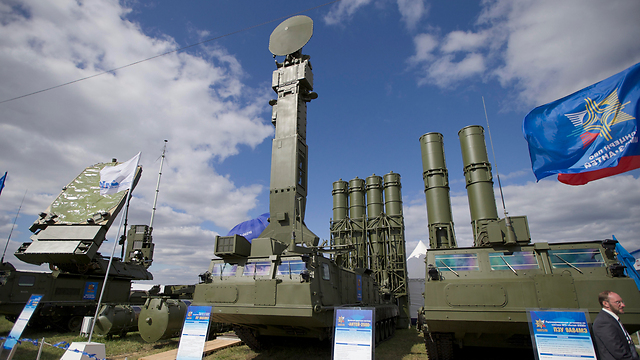
PM Netanyahu (R) and Russian President Putin
Photo: EPA

PM Netanyahu to meet President Putin in Moscow Wednesday
President Putin has invited PM to attend parade for Victory Day over Nazi Germany, PMO says, adding two will later meet in Kremlin; it will be their 8th meeting in past 2 years; before arriving in Moscow, Netanyahu will meet Cypriot President Anastasiades, Greek PM Tsipras in Cyprus.
Prime Minister Benjamin Netanyahu will meet Russian President Vladimir Putin in Moscow Wednesday to "discuss regional developments," a statement released by the Prime Minister's Office Saturday said, marking the leaders' first meeting since Russia blamed
Israel for an airstrike
in Syria last month.
In addition, Putin invited Netanyahu to participate with the Russian leader in the annual march marking the Soviet victory over Nazi Germany, after which they will convene in the Kremlin.
The meeting was confirmed following a phone conversation between the two this past Monday, in which they had agreed to meet as soon as possible.
This will mark the two leaders' eighth meeting in the past two years. During the period, they spoke at least 12 times on the phone.
Before arriving in Russia, Netanyahu will embark for Cyprus Tuesday, for a tripartite meeting with Cypriot President Nicos Anastasiades and Greek Prime Minister Alexis Tsipras.
Russia blamed Israel in early April for the strike, saying in a statement by the Russian army that two Israeli fighter jets carried out the attack on the T-4 Airbase near Homs. Later on, a Russian statement said, "Syrian air defense intercepted five out of eight missiles that were fired from Lebanese airspace."
Following the strike, the Israeli ambassador in Moscow was called into the Russian Foreign Affairs Ministry to provide clarifications. The prime minister also spoke with President Putin on the phone, with the latter asking Netanyahu to put an end to further airstrikes in the war-torn country, as they may further destabilize it.
Footage of the attack
On the Israeli side, growing concern could be noted surrounding the possible sale of the Russian-made S-300 aerial defense system to Syria. A Russian diplomat said two weeks ago that Israel contacted Russia asking for the system to not be provided to Syrian President Bashar Assad's army.
Russian daily Kommersant quoted experts that said Israel may respond negatively to such a decision, going so far as to bomb the area in which they are stationed.
Yedioth Ahronoth military commentator Ron Ben-Yishai noted recently that the head of the Russian General Staff Col.-Gen. Sergei Rudskoi's affirmation of the sale of the S-300 system to Syria should be taken seriously, not merely because the Russians wanted to exact a painful price against American, Western and Israeli interests in the region but also because Russia will leverage any situation to increase its foreign currency intake at the expense of its allies' distress.
The S-300 aerial defense system is more advanced and efficient than any other antiaircraft system currently in Syrian hands. The system is capable of intercepting not only planes but also ballistic and possibly even cruise missiles at ranges of more than 150 kilometers and at extremely high altitudes.
While Syria sought to procure the system from Russia—with Iranian financing—Russia has thus far refrained from finalizing the sale under American and Israeli pressures.

















